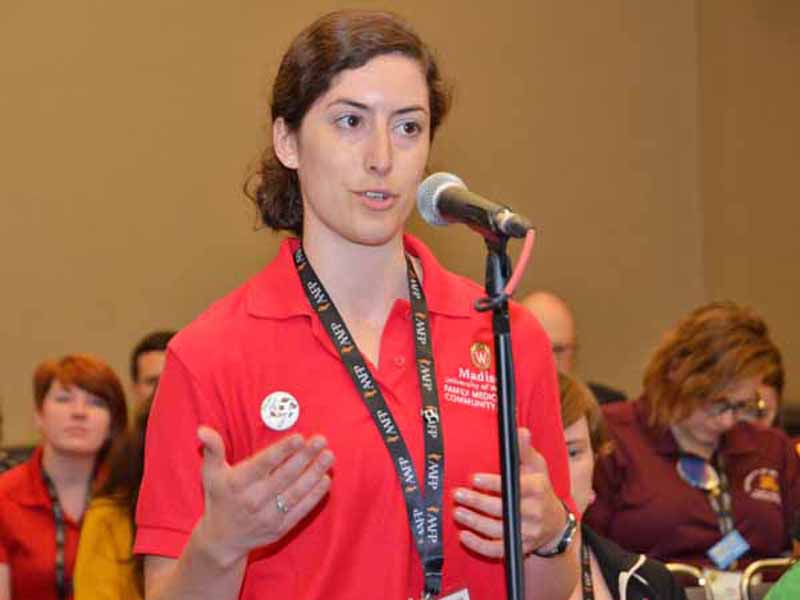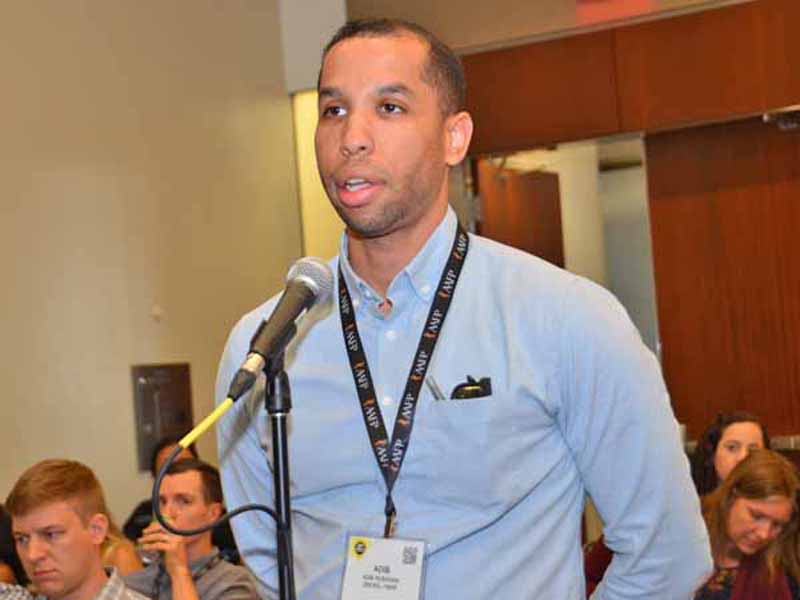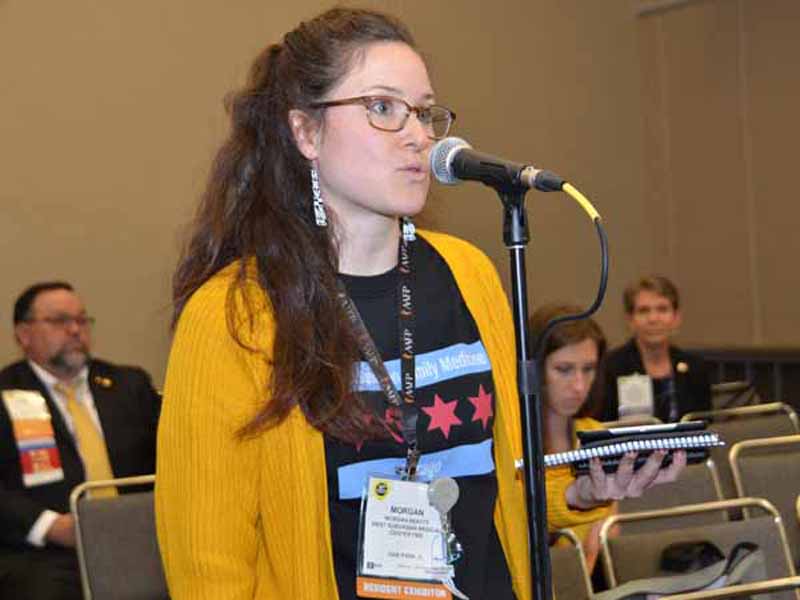2019 National Congress of Family Medicine Residents
Residents Focus Discussions on Training, Patient Care
July 31, 2019 03:49 pm Sheri Porter Kansas City, Mo. – From July 25-27, family medicine proponents took over the downtown area that surrounds this city's convention center for the AAFP National Conference of Family Medicine Residents and Medical Students.
In fact, nearly 1,900 medical students and close to 1,300 residents attended this annual gathering, and a good many of those residents participated in the 2019 National Congress of Family Medicine Residents.
These ambitious young physicians wrote and discussed 27 measures aimed at enhancing their training and improving their ability to provide the best possible care for their patients.

Reference committee hearings were held on July 26, and the full resident congress voted on resolutions and substitute resolutions the following day. In keeping with the AAFP's policymaking process, adopted measures will be reviewed and referred, when applicable, to AAFP leaders for further consideration and action.
Access to Drugs for Opioid Use Disorder
One resolution at this year's meeting dealt with family physicians' inability to prescribe methadone in the primary care setting for treatment of opioid use disorder.
Resolution co-author Taylor Boland, M.D., of the University of Wisconsin Department of Family and Community Health's Madison Family Medicine Residency Program, told a reference committee that physicians need more options for battling OUD.
"As we all know, suboxone is a recent option for OUD, and that can be prescribed in the primary care setting with an eight-hour training session. And even though we're able to prescribe methadone for our primary care patients for chronic pain and pain conditions, we can't prescribe it for OUD," said Boland.
The resolution noted that the Narcotic Addiction Treatment Act of 1974 allows for treatment of OUD with methadone only by federally licensed narcotic treatment programs.
Story Highlights
Unfortunately, some patients can't tolerate suboxone, said Boland. "Methadone is another option for them, but I can't prescribe it in my primary care clinic, so I have to send them to a methadone clinic. I work in a rural area. Patients aren't going to travel 30, 40, 55 minutes into town every day to get methadone," she said. "These patients are at extreme risk of relapse if we're stumbling to find an option for treatment."
Erika Rothgeb, M.D., of the Clarkson Family Medicine Residency Program in Omaha, Neb., also co-authored the resolution. "We are very passionate about addiction medicine, and working on the opioid crisis is at the forefront of medicine. You can't go a day without hearing about the opioid crisis and the new legislation that's been enacted to address it," said Rothgeb.
"I come from a largely rural state, and more than half our population lives in rural areas," she added. However, "92% of methadone clinics are in urban areas, and so this is also about promoting rural care," she added.
Residents adopted the resolution, which asked that the AAFP advocate for methadone maintenance treatment within primary care clinics without a separate federal license.
Another resolution asked the AAFP to advocate for the removal of buprenorphine prescribing restrictions.
Co-author Eric Kim, M.D., Ph.D., of the University of Colorado Family Medicine Residency in Denver, noted that the benefits of medication-assisted therapy for OUD have been thoroughly documented. "In fact, the AAFP has a position paper that outlines in great detail that these things should be supported and that barriers should be reduced as much as possible," he said.
"Clearly, this is a very safe and effective treatment," said Kim.
Christina Miles, M.D., of University of Washington Family Medicine Residency in Seattle, testified that there is a paucity of MAT providers and trainers across the country. "The training is actually quite cumbersome … and if it's not completed in the 30-day window, you have to start all over again," she said.
"This well-intentioned mechanism has become overly burdensome and is leading to exacerbations in poor patient outcomes and unnecessary opioid-related deaths."
Residents voted to adopt the resolution, which asks the AAFP to support legislation to deregulate buprenorphine administration in office-based, outpatient MAT and to amend current policy to include the deregulation of buprenorphine as a way to encourage such therapy.

Residency, Hospital Closures
A series of resolutions addressed the of shuttering of family medicine residency programs and hospital closures -- and the effect of those actions on residents and their training.
The first of those resolutions asked the AAFP to develop a policy to assist and support family medicine residency "in the unforeseen circumstance that the residency program shuts down."
A second resolution asked the AAFP to lobby the Accreditation Council for Graduate Medical Education to create a crisis response plan in the event a hospital closes or files for bankruptcy and also asked the ACGME and its Institutional Review Committee to monitor hospital financial operations.
A third resolution urged the AAFP to intercede on behalf of residents at Hahnemann University Hospital for the quick release of CMS GME funds to residents in closing programs, and a fourth resolution called on the AAFP to lobby the ACGME Institutional Review Committee to form a crisis plan to help residency programs change sponsorship during hospital closures with minimal delay in residents' training.
Lastly, a measure introduced by Adib Rushdan, M.D., of the Drexel University College of Medicine Family Medicine Residency program in Philadelphia, which was adopted as a substitute resolution, encouraged the AAFP to work with the ACGME and other stakeholders to establish policy that, in the event of a program closure, would relieve residents and fellows of the financial burden of record retention and place all responsibility -- including any financial burden -- of retaining training records on the sponsoring institution.
Rushdan's testimony was especially compelling because he also trains at Hahnemann University Hospital. "We were made aware as of June 2019 that it would be closing due to bankruptcy," he told the reference committee.
"I was one of the residents in the hospital on my inpatient service doing a new patient orientation for the new interns. We were made aware of this horrific information that the population that we serve in the inner city of Philadelphia at Hahnemann, a safety-net hospital and one of the last such safety nets in the city, would no longer have this protection," said Rushdan.
He ended his testimony on a high note: "Our program is solid -- we're still providing outpatient care at our outpatient offices," he said.
All five of these measures were adopted by residents in the July 27 business session.
Immigrant Health Issues
Morgan Beatty, M.D., of the West Suburban Medical Center Family Medicine Residency Program in Chicago, testified in support of a resolution that asked the AAFP to stand against separation of immigrant children from their parents during detention after crossing into the United States at the southern border.
"There are specific laws as to what ICE (Immigration and Customs Enforcement) officials are legally allowed to do with the children -- including keeping them in ICE custody no longer than 72 hours before they are to be taken to another facility that is run by HHS and that includes a full spectrum of services, including education, health care, and psychological and mental health services," said Beatty.

"Some children are held longer and in situations where their rights are not being upheld," she added.
Resolution co-author Reshma Ramachandran, M.D., M.P.P., of the Kaiser Permanente Southern California-Los Angeles Family Medicine Residency Program, said, "I also want to ensure timely access to health and dental services, and to think about other options for prevention of separation of children from families at the border."
Medical student Jacob Groen, of Pacific Northwest University of Health Sciences College of Osteopathic Medicine in Yakima, Wash., also supported the resolution.
"The AAFP prides itself on being the specialty for all people. We want to treat every single person who needs care, and separating that from the politics of immigration is important," he said.
Residents adopted a substitute asking the AAFP to call for timely access to medical, dental and mental health care, as well as basic sanitation services, and to urge the Department of Homeland Security to find alternatives to separation of families.
Another substitute resolution that was adopted asked the AAFP to create a toolkit and workshop template to help increase physician knowledge about the health and well-being of immigrant and refugee patients, and to hold a workshop on this topic at this same conference in 2020.
Residents adopted or reaffirmed a number of other resolutions or substitute resolutions on a variety of topics, including
- screening and treatment of health conditions related to poor water quality,
- implementing intense EHR training,
- increasing gender-affirming therapy for adolescents,
- opposing criminalization of physicians providing abortion care,
- denouncing race-based medicine, and
- declaring an AAFP preference for a single-payer health care system.
Related AAFP News Coverage
2019 National Conference
Many Maps, One Aim: Charting a Course to Family Medicine
(7/31/2019)
2019 National Congress of Student Members
Students Focus on Physican Wellness, Additional Training
(7/31/2019)
2019 National Conference
Students, Residents Elect New Leaders for the Coming Year
(7/27/2019)
More From AAFP
National Conference: Day Three(wakelet.com)